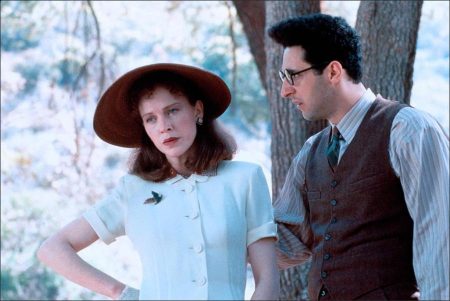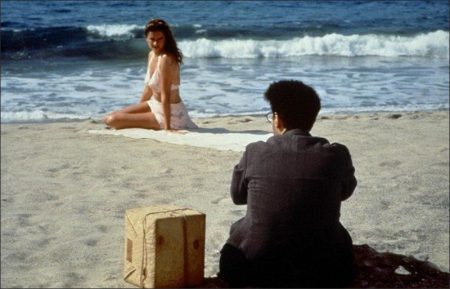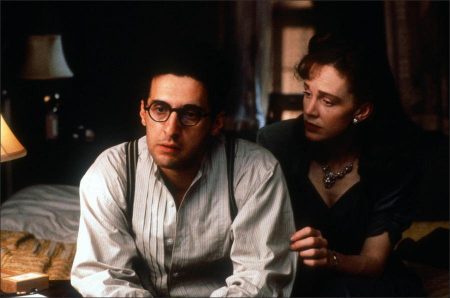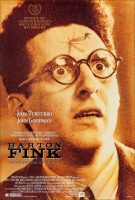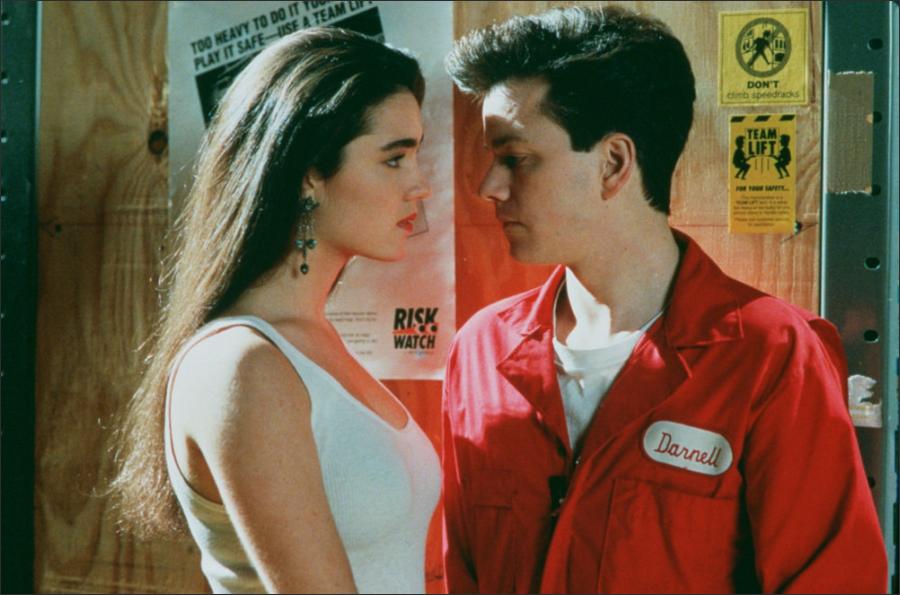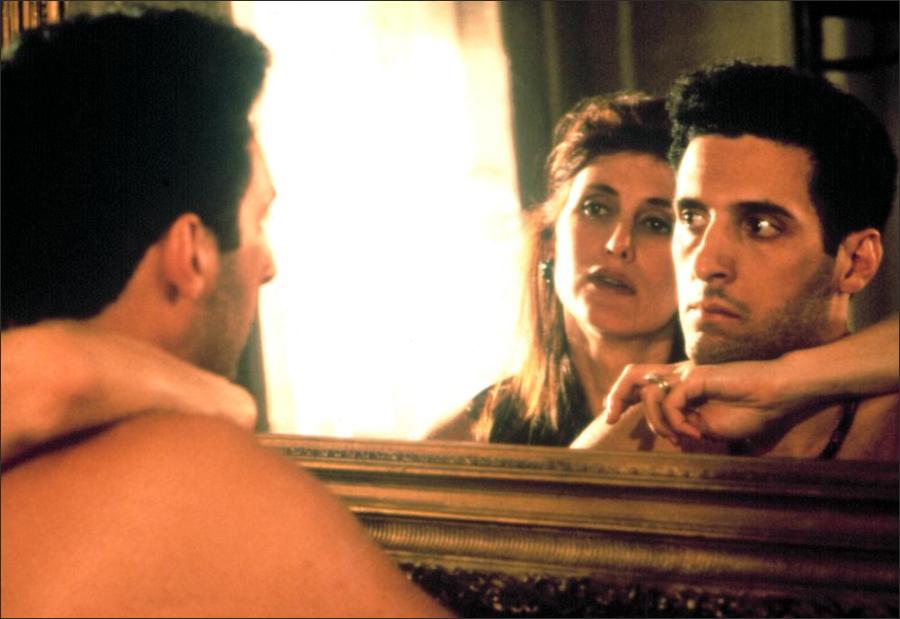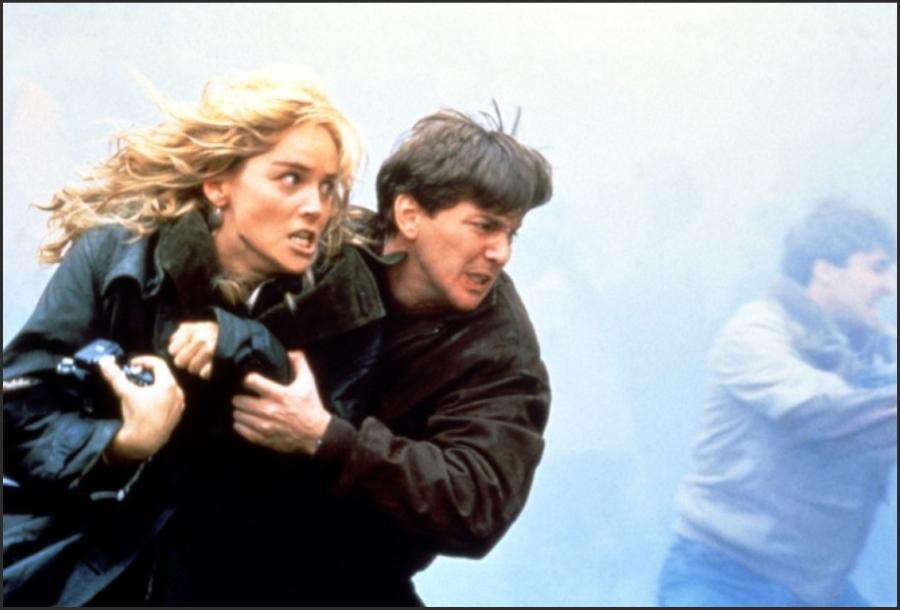Taglines: There’s only one thing stranger than what’s going on inside his head. What’s going on outside.
Barton Fink movie storyline. In 1941, Barton Fink’s first Broadway play, Bare Ruined Choirs, has achieved critical and popular success. His agent informs him that Capitol Pictures in Hollywood has offered him a thousand dollars per week to write film scripts. Barton hesitates, worried that moving to California would separate him from “the common man”, his focus as a writer. He accepts the offer, however, and checks into the Hotel Earle, a large and unusually deserted building. His room is sparse and draped in subdued colors; its only decoration is a small painting of a woman on the beach, arm raised to block the sun.
In his first meeting with Capitol Pictures boss Jack Lipnick, Barton explains that he chose the Earle because he wants lodging that is (as Lipnick says) “less Hollywood”. Lipnick promises that his only concern is Barton’s writing ability and assigns his new employee to a wrestling film. Back in his room, however, Barton is unable to write. He is distracted by sounds coming from the room next door, and he phones the front desk to complain.
His neighbor, Charlie Meadows, is the source of the noise and visits Barton to apologize, insisting on sharing some alcohol from a hip flask to make amends. As they talk, Barton proclaims his affection for “the common man”, and Charlie describes his life as an insurance salesman. Later, Barton falls asleep, but is awakened by the incessant whine of a mosquito.
Still unable to proceed beyond the first lines of his script, Barton consults producer Ben Geisler for advice. Irritated, the frenetic Geisler takes him to lunch and orders him to consult another writer for assistance. While in the men’s room, Barton meets the novelist William Preston (W.P.) “Bill” Mayhew, who is vomiting in the next stall. They briefly discuss movie writing and arrange a second meeting later in the day.
When Barton arrives, Mayhew is drunk and yelling wildly. His secretary, Audrey Taylor, reschedules the meeting and confesses to Barton that she and Mayhew are in love. When they finally meet for lunch, Mayhew, Audrey, and Barton discuss writing and drinking. Before long, Mayhew argues with Audrey, slaps her, and wanders off, drunk. Rejecting Barton’s offer of consolation, Audrey explains that she feels sorry for Mayhew since he is married to another woman who is “disturbed”.
Barton Fink is a 1991 American period film written, produced, directed and edited by the Coen brothers. Set in 1941, it stars John Turturro in the title role as a young New York City playwright who is hired to write scripts for a film studio in Hollywood, and John Goodman as Charlie, the insurance salesman who lives next door at the run-down Hotel Earle.
The Coens wrote the screenplay for Barton Fink in three weeks while experiencing difficulty during the writing of Miller’s Crossing. They began filming the former soon after Miller’s Crossing was finished. The film is influenced by works of several earlier directors, particularly Roman Polanski’s Repulsion (1965) and The Tenant (1976).
Barton Fink had its premiere at the Cannes Film Festival in May 1991. In a rare sweep, it won the Palme d’Or, as well as awards for Best Director and Best Actor (Turturro). Although the film was a box office bomb, only grossing $6 million against its $9 million budget, it received positive reviews and was nominated for three Academy Awards. Prominent themes of Barton Fink include the writing process; slavery and conditions of labor in creative industries; superficial distinctions between high culture and low culture; and the relationship of intellectuals with “the common man”.
Barton Fink (1991)
Directed by: Joel Coen
Starring: John Turturro, John Goodman, Judy Davis, Michael Lerner, John Mahoney, Jon Polito, Steve Buscemi, Christopher Murney, Meagen Fay, Lance Davis, Anthony Gordon
Screenplay by: Ethan Coen, Joel Coen
Production Design by: Dennis Gassner
Cinematography by: Roger Deakins
Film Editing by: Ethan Coen, Joel Coen
Costume Design by: Richard Hornung
Set Decoration by: Nancy Haigh
Art Direction by: Robert C. Goldstein, Leslie McDonald
Music by: Carter Burwell
MPAA Rating: R for language and some scenes of violence.
Distributed by: 20th Century Fox
Release Date: August 21, 1991
Views: 182
